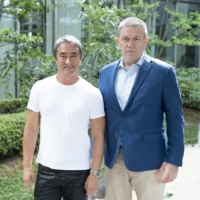Japanese investors are opening up to and actively seeking investment opportunities from all around the world, and they are turning to new platforms for access to domestic and overseas startups. Together, these startups enjoy accelerated growth while partnered Japanese investors see strong returns in new industries or from companies leveraging new sustainable technologies applied to traditional industries.
Not only financial firms, but also government agencies and accelerators are increasing interest in foreign startups. Even Japanese universities are growing internal entities that focus on startups and innovation. Top institutions such as Tokyo University, Kyoto University and financial powerhouses like Sumitomo Mistui Banking Corp. and Mitsubishi UFJ Financial Group are names recognized in this growing community. Naturally, many overseas startup representatives are visiting Tokyo to present ideas and search for funding opportunities.
Startups, together with an astute and savvy Japan investor base, are cultivating deeper ties and nurturing innovation in medical and financial technology, the Internet of Things and much more, fostering growth in these numerous areas and inspiring much-needed innovation in the Japanese economy.
With this growing interest in new startups, events that lead to new connections and relationships are important. On March 17 of this year, a group of Israeli venture capital firms presented their best selection of startups to interested Japanese and international thought leaders in Japan. Organized by Daniel Kolbar, minister of economic affairs from the Embassy of Israel, and Joseph Bodenheimer, founder of Venture Invess, this event kicked off a series of meetings and exchanges.
“While the number of Israeli-based startups has increased dramatically, Japanese investors have eagerly embraced the corresponding opportunities. Note that 2021 saw a record of nearly $3 billion investment from Japan in Israeli high tech, representing nearly 16% of total foreign investment. The recent event provided a platform for startups and investors that accelerates the investment process and builds relationships. It was a pleasure co-hosting the event with Joseph of Venture Invess, and we look forward to continue working together,” Kolbar said.
“For any venture capitalists, including MPower Partners, Israel is a fascinating country to watch for its robust startup ecosystem. The event was immensely useful and informative, especially at a time when traveling was virtually impossible. We made many useful contacts and already look forward to future events,” said Yumiko Murakami, general manager of MPower Partners.

Friendly, culturally acceptable
Reading a pitch deck online has limited utility. Ultimately, meeting founders face-to-face to hear their story and feel their passion is incredibly important when investing in early-stage companies that are pre-revenue and still developing a minimum viable product.
For over 30 years, Japanese companies have been enamored with technology companies in Israel. Fostering a highly diplomatic relationship, Japan has interacted with Israel in a way that benefits both countries in the near and long terms. While there remain challenges to curating and tailoring endless waves of information on startups, a growing number of investor groups are eager to build relationships with actionable startup ideas directly or via venture capital groups.
Japan as a country is known for studying and deep-dive learning, which makes the vetting process a long one. However, once strong relationships and trust are established, opportunities and the subsequent actions come to fruition.
Makio Inui, a venture financier, added: “To those who have the toolkit to remove the vail of cultural eccentricity and communication challenge posed by what is largely a monolingual society, the appeal of the Japanese startup asset class is irresistible. Smart money knows Japanese venture.”
One noticeable change since Japan started opening up to business travel is the number of operators on the ground to facilitate and properly platform eager startup teams in their quest to reach out to local institutions. While this approach is effective, there are corresponding challenges as well. David Case, a venture capital attorney based in Silicon Valley, shared that “given the high rate of failure of startup companies, Japanese investors need to take additional steps to educate themselves about new technologies, early-stage companies and their founders, the competitive landscape and the company’s growth prospects. Investors need quality information to make investment decisions.”
It is becoming clear that a key component of making decisions from quality information is building a startup culture, one that encourages organizing meetings, presentations, events and even user-friendly websites to enhance a deeper understanding of startups across the board.
While Japan has become a popular destination for global startups who seek to build mutually beneficial investor relationships, language barriers and cultural differences may still be a challenge. Startups that are patient, especially those committed to building strong interpersonal relationships, find success. We achieved our goal by building an investor ecosystem that is eager to engage and learn more about startups and their technologies. “Building a powerful ecosystem of thought leaders and investor relationships takes years but is well worth the effort, as Japanese engage and open up to those who embrace sustainability and long-term investments,” said Bodenheimer.





